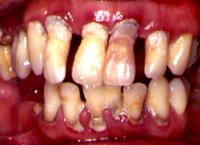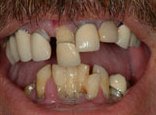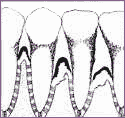Diabetes and periodontal disease: A complex, two-way connection
Dental visits among dentate adults with diabetes--United States, 1999 and 2004.
MMWR Morb Mortal Wkly Rep. 2005 Nov 25;54(46):1181-3.
Centers for Disease Control and Prevention (CDC).

One of the major complications of diabetes is periodontal disease, a chronic infection of tissues supporting the teeth and a major cause of tooth loss. Adults with diabetes have both a higher prevalence of periodontal disease and more severe forms of the disease, contributing to impaired quality of life and substantial oral functional disability. In addition, periodontal disease has been associated with development of glucose intolerance and poor glycemic control among adults with diabetes. Regular dental visits provide opportunities for prevention, early detection, and treatment of periodontal disease among dentate adults (i.e., those having one or more teeth); moreover, regular dental cleaning improves glycemic control in patients with poorly controlled diabetic conditions. One of the national health objectives for 2010 is to increase the proportion of persons with diabetes who
 have an annual dental examination to 71% (revised objective 5-15). To estimate the percentage of dentate U.S. adults aged > or =18 years with diabetes who visited a dentist within the preceding 12 months, CDC analyzed data from the Behavioral Risk Factor Surveillance System (BRFSS) surveys for 1999 and 2004. This report describes the results of that analysis, which indicated that, in 2004, age-adjusted estimates in only seven states exceeded 71% and estimated percentages for four states and District of Columbia (DC) increased significantly from their levels in 1999. The findings underscore the need to increase awareness and support for oral health care among adults with diabetes, including support for national and state diabetes care management programs.
have an annual dental examination to 71% (revised objective 5-15). To estimate the percentage of dentate U.S. adults aged > or =18 years with diabetes who visited a dentist within the preceding 12 months, CDC analyzed data from the Behavioral Risk Factor Surveillance System (BRFSS) surveys for 1999 and 2004. This report describes the results of that analysis, which indicated that, in 2004, age-adjusted estimates in only seven states exceeded 71% and estimated percentages for four states and District of Columbia (DC) increased significantly from their levels in 1999. The findings underscore the need to increase awareness and support for oral health care among adults with diabetes, including support for national and state diabetes care management programs. What is the Link Between Diabetes and Periodontal Disease?
What is the Link Between Diabetes and Periodontal Disease?Diabetic Control.
Like other complications of diabetes, gum disease is linked to diabetic control. People with poor blood sugar control get gum disease more often and more severely, and they lose more teeth than do persons with good control. In fact, people whose diabetes is well controlled have no more periodontal disease than persons without diabetes. Children with IDDM (insulin-dependent diabetes mellitus) are also at risk for gum problems. Good diabetic control is the best protection against periodontal disease.
Studies show that controlling blood sugar levels lowers the risk of some complications of diabetes, such as eye and heart disease and nerve damage. Scientists believe many complications, including gum disease, can be prevented with good diabetic control.
Blood Vessel Changes.
Thickening of blood vessels is a complication of diabetes that may increase risk for gum disease. Blood vessels deliver oxygen and nourishment to body tissues, including the mouth, and carry away the tissues' waste products. Diabetes causes blood vessels to thicken, which slows the flow of nutrients and the removal of harmful wastes. This can weaken the resistance of gum and bone tissue to infection.
Bacteria.
Many kinds of bacteria (germs) thrive on sugars, including glucose -- the sugar linked to diabetes. When
 diabetes is poorly controlled, high glucose levels in mouth fluids may help germs grow and set the stage for gum disease.
diabetes is poorly controlled, high glucose levels in mouth fluids may help germs grow and set the stage for gum disease.Smoking.
The harmful effects of smoking, particularly heart disease and cancer, are well known. Studies show that smoking also increases the chances of developing gum disease. In fact, smokers are five times more likely than nonsmokers to have gum disease. For smokers with diabetes, the risk is even greater. If you are a smoker with diabetes, age 45 or older, you are 20 times more likely than a person without these risk factors to get severe gum disease.
> Free Article from JCDC >The Relationship Between Diabetesand Periodontal Disease
http://www.cda-adc.ca/jcda/vol-68/issue-3/161.pdf




0 Comments:
Post a Comment
<< Home